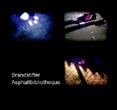
|
|
| |
Listed in genres:
· Soundscapes, Field Recordings
|
|
Notes:
|
"Is this ‘Music’? Is this what John Cage was referring to when he claimed, in the 1930s, that every sound one day could be used for musical means? - A survey over the development of music and the fine arts since the start of the 20th century, which marked the arrival of the artistical avant-garde?, reveals that the terminology concerning the fine arts was widened as soon as the Dada-movement emerged. It would take some more decades before the same happened with music. It was only when the Fluxus-movement premiered their musical and anti-musical actions in the 1950s and 1960s that an emancipation of sounds from traditional notions of composition would be brought about. In the same way in which Duchamps Ready Mades questioned the role of the ‘fine’ artist as a craftsman these actions challenged traditional notions of the composer.
Branstifters recordings for an "Asphaltbibliotheque" follow this tradition. They do not claim to be musical compositions in any conventional sense, but rather have to be understood within their performative context. On a visual level the Asphaltsbibliotheque consists of ready-made pieces, which are only altered due to the artist’s choice which pieces to incorporate. In the same way in which retrieved slips of paper from the sidewalks were never supposed to be art, the sounds on this CD do not go beyond anything that has not been collected. They constitute an acoustic process, on which the artist has no direct influence or at least no downright control - even though he may decide which specific sound to play at which specific time and place. But the artistic act of collecting - of slips of papers or of sounds - causes a transformation: what was thrown away, lost or forgotten is restored, mundane pieces are catalogued and thereby often become poetry. Seemingly insignificanct things like postcards, shopping lists or a janitor’s warning sign for tenants acquire a new meaning in the context of the Asphaltbibliotheque - a meaning that surpasses the inherent humorous and grotesque qualities of the written words.
These are acts of communication, which at times seem to be ritual, at times contrived, at other times aggressive and sometimes even a cry for help. Often it is just a stammering which Beckett could not have conceived of more poignant in his plays. You cannot help but think about these people which are unfamiliar to you. You think about their dilemmas and the suffocating order of a world which gave birth to these documents.
The same applies to sound and "field recordings", which the recordings at hand also are. They prevent the fleeting things from vanishing and force us to listen closely to those sounds which we would usually suppress or try to ignore, because we do not deem them music. Music in its traditional understanding emerges when sound is brought into an order. Yet the seemingly unordered sounds on these recordings reveal that even the alleged chaos is structured: Order is always pre-given, pervading the whole world, since the making of order is the original reason for every kind of communication and the selective mechanisms our senses adhere to. The genuine quality of Brandstifters art is its disclosing of this knowledge. The question if this is music or not becomes obsolete."
[Martin Büsser (Translation Benjamin Borgerding)]
Lim. to 50 copies.
Tracklist:
1. Asphaltbibliotheque (Mainz 1998)
2. Fundzettelbach (Worms 2006)
3. Ein kleines Stück Papier (Hannover 2003)
|
| |
|